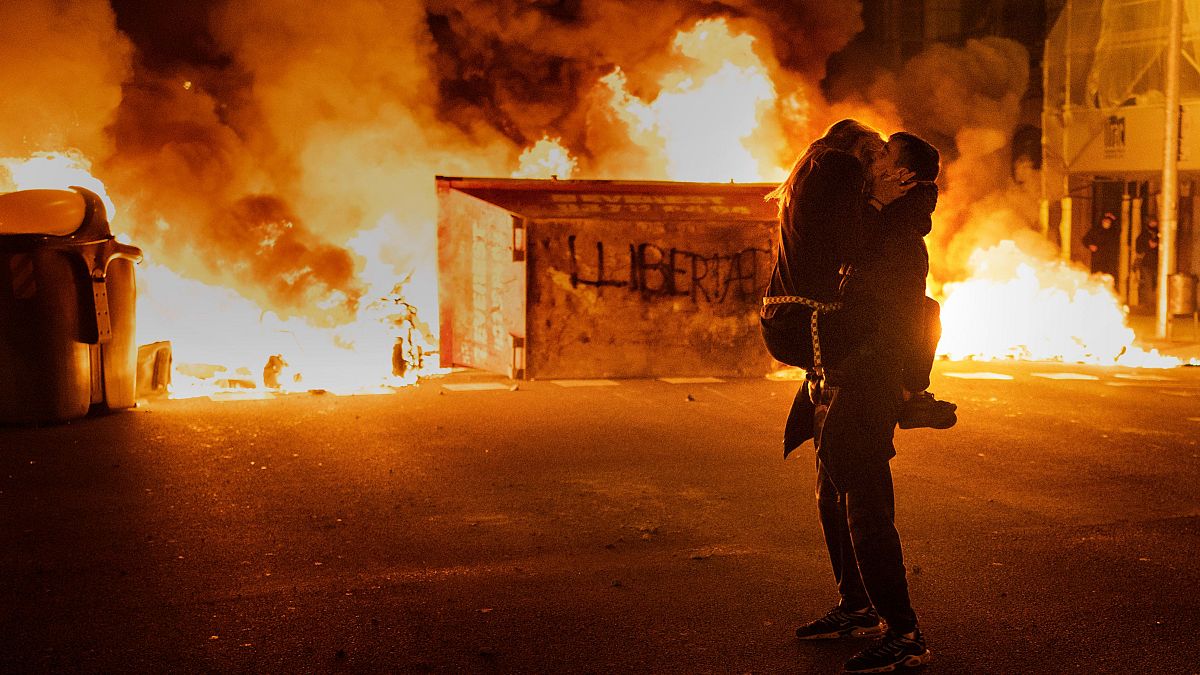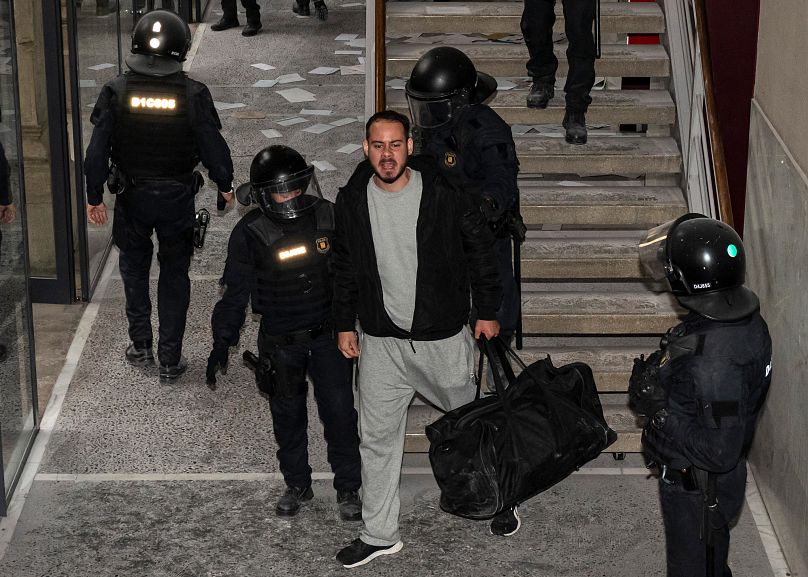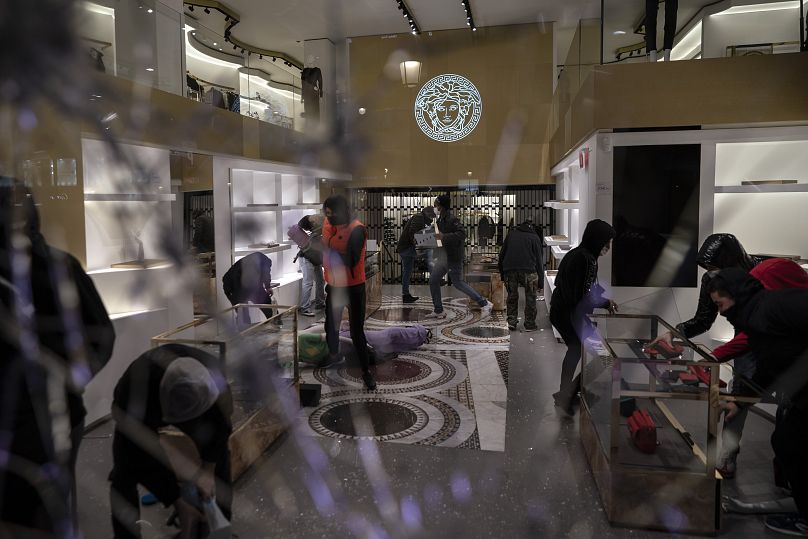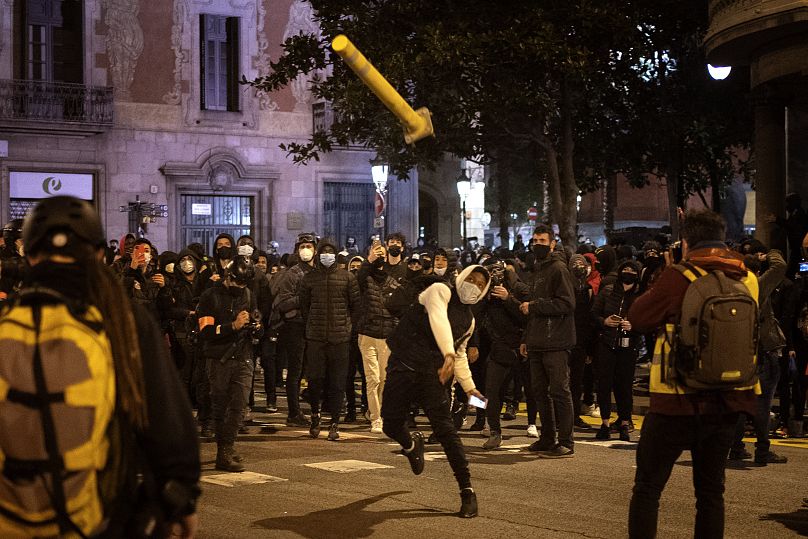For more than a week protests have raged over the jailing of rapper Pablo Hasél, whose sentence has ignited a heated debate over freedom of expression in Spain.
Every night since last Tuesday, protesters have been taking to the streets of Barcelona and other Spanish cities in their thousands, calling for a rapper’s release from prison.
Pablo Hasél, a previously obscure artist in the Spanish music scene, is now at the centre of a battle over freedom of expression in the country.
He has been jailed for his lyrics and tweets which the courts said glorified terrorism, but he was also charged and found guilty of insulting the royal family and the police.
Since his arrest on February 16 at Lleida University — where he had barricaded himself in with dozens of supporters — protests have been held across Spain, the biggest of which have been in his native Catalonia.
He is set to serve a nine-month prison sentence. The government has said it is looking at changing the law that led to his imprisonment. And amid this, some streets of central Barcelona have turned nightly into something resembling a war zone as protests turned violent.
Why has Pablo Hasél been jailed?
He has been jailed for tweets that judges deemed glorified the now-defunct terror groups Grapo and ETA, and for insulting the monarchy and police.
This followed a conviction in 2018, that was subject to a number of appeals.
But the reason he has been sent to prison, rather than receiving a suspended sentence, is that he already had a suspended prison sentence for previous offences, that had been suspended for three years on the condition he did not offend again.
Hasél was punished under the Public Security Law, known by some as the “gag law”, which was controversially introduced by the previous conservative administration in 2015.
Following the protests over Hasel’s case, Spain’s left-wing coalition government has said it will change the country’s criminal code to remove prison sentences for offences involving freedom of expression - but thus far there has been no deadline set.
As for the charges themselves, many argue there is no incitement to violence in the rapper’s words, as the terror groups mentioned no longer exist.
Amnesty International has decried his prison sentence, with the organisation’s director in Spain, Esteban Beltrán, saying: "No one should face criminal prosecution only for expressing themselves on social media or for singing something that may be distasteful or shocking. Expressions that do not clearly and directly incite violence cannot be criminalised."
Nightly protests have turned violent
There has been an outcry over the rapper’s arrest, not just from protesters on the street, but from high profile names in the Spanish arts too.
The likes of Javier Bardem and Pedro Almodóvar are among 200 artists to sign a manifesto defending the rapper, demanding, along with his freedom, that “these types of crimes be expelled from the Penal Code".
But while the majority of those that have taken, and are taking, to the streets are doing so peacefully, a minority have been constructing barricades in the streets, setting fire to buildings, vehicles and bins, and attacking police, who have hit back.
Storefronts were smashed in on a number of nights in the past week, with some looting taking place.
Catalonia’s regional interior minister, Miquel Sàmper, on Sunday told the regional TV3 broadcaster that what was “a protest over freedom of expression” had evolved to "acts of pure vandalism”.
But these acts have been blamed by many protesters and politicians on a small minority of mainly younger people who are setting out to cause trouble and don’t necessarily espouse the ideals of the wider protest movement.
Mixed feelings on the streets of Barcelona
Away from the heated confrontations at the evening protests in Barcelona - which have seen shops smashed and looted, fires started and fighting with police - residents have mixed feelings about the incarceration of Hasél, and the demonstrations.
Barbara Caschili, 40, told Euronews it is dangerous to take her dog out for a walk at night, as she sees fires near her house, and a shop below her flat was even broken into and robbed.
Despite this chaos on her doorstep, she supports the wider message of the protests and believes the law that put Hasél in prison needs to change.
“This is the country in Europe with the most people in prison over this issue, the issue of freedom of expression. We are in Spain, not China,” she argues.
“This man is in prison when there are many politicians that have robbed for many years, and they are not in prison.”
Adi, 29, believes the people who are smashing up the city “are children”.
“They do this for fun. They don’t even understand why they do it. The protests that are legal and don't destroy anything, they are cool, but at night everything changes,” he says.
“From what I know about Hasél, I agree with criticism of the government, but not with terrorism. This guy defended ETA, it’s not right,” he adds.
One person strongly in favour of the protests is Wanda, a musician, who says she was listening to Hasél four years ago when he had a very low profile.
He only rose to prominence following his legal troubles, and Wanda argues politicians don’t understand the culture of rap and that what is said in lyrics shouldn’t always be taken too seriously.
“The state power thinks it has to do something because he is insulting them a lot,” says the 24-year-old.
“I don't know much about the sentencing, but I know this is a power game. The protesters are being aggressive, maybe it's not the way. But now we don't have another way. We are answering with the same violence that we are living with.”
Bienvenido Mur agrees with the arguments of Hasél’s lawyers in court - that ETA and Grapo are no longer a threat, hence his lyrics aren’t inciting violence.
“It's not real, now there's no terrorism,” says the salesman, 54. ETA and Grapo are dead, and you can say anything, but there's no people with guns in the streets. The politicians and judges are not right in this case.
He says young people are living in a tough situation currently - economically, politically, and in terms of freedom of expression.
“It's too hard for the young people living now. But there's another way. To protest without violence is the best.”
Every weekday at 1900 CET, Uncovering Europe brings you a European story that goes beyond the headlines. Download the Euronews app to get an alert for this and other breaking news. It's available on Apple and Android devices.



